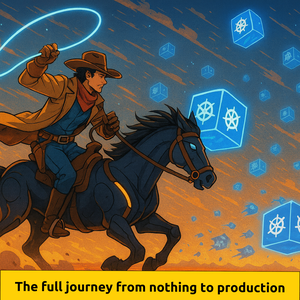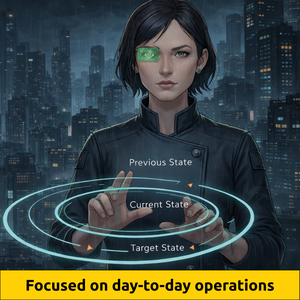TL;DR
Mirantis introduces Pelagia, an open source tool to streamline Ceph storage management on Kubernetes, advancing automation and integration with GitOps workflows.
Key Points
Highlight key points with color coding based on sentiment (positive, neutral, negative).Pelagia is an open source project by Mirantis designed to enhance lifecycle management for Ceph storage on Kubernetes, complementing Rook by automating operations and simplifying control for large-scale deployments.
It provides a unified control surface for Ceph clusters through a concise set of high-level CRDs/APIs, simplifying management routines and improving transparency into cluster status.
Pelagia integrates with GitOps workflows and standardizes Ceph operations across Kubernetes clusters, making it suitable for large, bare-metal, and high-traffic environments.
It plays a central role in Mirantis' broader infrastructure strategy, including integration with the k0rdent platform for Kubernetes-native clouds, where it provides consistent lifecycle management for Ceph-backed persistent volumes.
Pelagia is released as open source, reflecting Mirantis' commitment to open source infrastructure projects, and is available for community use and contribution.
Key Numbers
Present key numerics and statistics in a minimalist format.Pelagia has been used for a certain number of years to deploy and manage large production Ceph clusters.
OpenStack deployments leverage the integration of OpenStack, Kubernetes, and Ceph, with a certain number of cores globally implementing that open infrastructure blueprint.
Stakeholder Relationships
An interactive diagram mapping entities directly or indirectly involved in this news. Drag nodes to rearrange them and see relationship details.Organizations
Key entities and stakeholders, categorized for clarity: people, organizations, tools, events, regulatory bodies, and industries.Developed and maintains the Pelagia project to enhance lifecycle management for Ceph storage on Kubernetes.
Tools
Key entities and stakeholders, categorized for clarity: people, organizations, tools, events, regulatory bodies, and industries.Enhances lifecycle management for Ceph storage on Kubernetes by automating operations and simplifying control for large-scale deployments.
Complemented by Pelagia to automate and simplify operations for large-scale deployments of Ceph on Kubernetes.
Integrates Pelagia as a storage lifecycle management component to standardize Ceph operations.
Industries
Key entities and stakeholders, categorized for clarity: people, organizations, tools, events, regulatory bodies, and industries.The primary industry where Pelagia is used to manage Ceph storage across Kubernetes clusters.
Timeline of Events
Timeline of key events and milestones.Rockoon, a major open source component of Mirantis OpenStack for Kubernetes, was published.
Mirantis Pelagia experts were present at the OpenInfra Summit Europe 2025 in Paris-Saclay.
Long-form summary
Mirantis has introduced Pelagia, an open source project aimed at improving the lifecycle management of Ceph storage on Kubernetes. This project is designed to complement Rook, a CNCF-hosted project, by adding automation and simplifying operations for large-scale deployments. Pelagia standardizes Ceph operations across Kubernetes clusters, integrates with GitOps workflows, and aligns with Mirantis' broader infrastructure strategy. It offers a streamlined control plane and high-level CRDs/APIs, making it easier to manage large, heavily loaded storage clusters.
Pelagia's development stems from its use in Mirantis OpenStack for Kubernetes (MOSK), where it managed large Ceph deployments in production. It addresses gaps in Rook, such as the lack of automated OSD decommissioning, especially on bare metal. By providing a higher-level controller, Pelagia reconciles its intent-driven CRDs into Rook objects and orchestrates cross-component workflows, enhancing the operator experience.
Within Mirantis' infrastructure strategy, Pelagia acts as the storage lifecycle layer for the k0rdent platform, which focuses on Kubernetes-native clouds. It ensures consistent and predictable lifecycle management of Ceph-backed persistent volumes and data volumes for KubeVirt-based VMs. Pelagia is set to be included in the k0rdent catalog with opinionated defaults and tested integrations, further solidifying its role in Mirantis' open source initiatives.
The open source release of Pelagia aims to enhance transparency and ease of management for cloud operators, allowing them to leverage Mirantis' operational best practices. It integrates with Rockoon, another open source component of MOSK, to facilitate the deployment of production-grade OpenStack clusters with a software-defined storage backend.
References
Enjoyed it?
Get weekly updates delivered straight to your inbox, it only takes 3 seconds!Subscribe to our weekly newsletter Kaptain to receive similar updates for free!
Give a Pawfive to this post!
Start writing about what excites you in tech — connect with developers, grow your voice, and get rewarded.
Join other developers and claim your FAUN.dev() account now!
FAUN.dev()
FAUN.dev() is a developer-first platform built with a simple goal: help engineers stay sharp withou…

Kaptain #Kubernetes
FAUN.dev()
@kaptainDeveloper Influence
13
Influence
1
Total Hits
125
Posts
Related tools
Featured Course(s)

End-to-End Kubernetes with Rancher, RKE2, K3s, Fleet, Longhorn, and NeuVector
The full journey from nothing to production




















